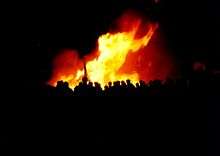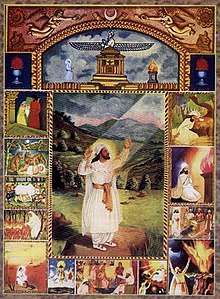Zoroaster, also known as Zarathustra or Zartosht, was the prophet of the Zoroastrian religion. It is now thought that he lived in eastern Iran or in central Asia around 1000 BC. The Gathas are hymns held by believers to have been written by Zoroaster.
Quotes

Hearken with your ears to these best counsels,
Reflect upon them with illumined judgment.
Reflect upon them with illumined judgment.
The Gathas
- Translation by Dinshaw Jamshedji Irani, in K. D. Irani, Rabindranath Tagore, The Gathas: the Hymns of Zarathushtra, K.R. Cama Oriental Institute, 1999, 96 p. at Zarathustra.com.
- Truth is best (of all that is) good. As desired, what is being desired is truth for him who (represents) the best truth.
- Ahunuvaiti Gatha; Yasna 27, 14.
- Unto Thee, O Lord, the Soul of Creation cried:
"For whom didst Thou create me, and who so fashioned me?
Feuds and fury, violence and the insolence of might have oppressed me;
None have I to protect me save Thee;
Command for me then the blessings of a settled, peaceful life."- Ahunuvaiti Gatha; Yasna 29, 1.
- Thus to the Lord doth Asha, the Truth, reply:
"No guide is known who can shelter the world from woe,
None who knows what moves and works Thy lofty plans."- Ahunuvaiti Gatha; Yasna 29, 3.
- Hearken with your ears to these best counsels,
Reflect upon them with illumined judgment.
Let each one choose his creed with that freedom of choice each must have at great events.- Ahunuvaiti Gatha; Yasna 30, 2.
- In the beginning there were two primal spirits,
Twins spontaneously active,
These are the Good and the Evil, in thought, and in word, and in deed.- Ahunuvaiti Gatha; Yasna 30, 3.
- For a thinking man is where Wisdom is at home.
- Ahunuvaiti Gatha; Yasna 30, 9.
- By Thy perfect Intelligence, O Mazda
Thou didst first create us having bodies and spiritual consciences,
And by Thy Thought gave our selves the power of thought, word, and deed.
Thus leaving us free to choose our faith at our own will.- Ahunuvaiti Gatha; Yasna 31, 11.
- He who upholds Truth with all the might of his power,
He who upholds Truth the utmost in his word and deed,
He, indeed, is Thy most valued helper, O Mazda Ahura!- Ahunuvaiti Gatha; Yasna 31, 22.
- He who abhors and shuns the light of the Sun,
He who refuses to behold with respect the living creation of God,
He who leads the good to wickedness,
He who makes the meadows waterless and the pastures desolate,
He who lets fly his weapon against the innocent,
An enemy of my faith, a destroyer of Thy principles is he, O Lord!- Ahunuvaiti Gatha; Yasna 32, 10.
- A reflective, contented mind is the best possession.
- Ushtavaiti Gatha; Yasna 43, 15.
- The resolute one who moved by the principles of Thy Faith
Extends the prosperity of order to his neighbors
And works the land the evil now hold desolate,
Earns through Righteousness, the Blessed Recompense
Thy Good Mind has promised in Thy Kingdom of Heaven.- Spenta Mainyu Gatha; Yasna 50, 3.
- A righteous government is of all the most to be wished for,
Bearing of blessing and good fortune in the highest.
Guided by the law of Truth, supported by dedication and zeal,
It blossoms into the Best of Order, a Kingdom of Heaven!
To effect this I shall work now and ever more.- Vohu-Khshathra Gatha; Yasna 51, 1.
- Satisfaction linked with dishonor or with harm to others is a prison for the seeker.
- Vahishto-Ishti Gatha; Yasna 53, 6.
Quotes about Zoroastrianism
- News arrived from Estakhan that the fire of the chief temple of Persia, which had burned for a thousand years, had become extinguished [at the time of the birth of Muhammad].
- Rauzat-us-Safa, or Garden of Purity by Muhammad bin Khavendshah bin Mahmud translated into English by E. Rehatsek, first published 1893, Delhi Reprint 1982, Quoted in in Goel, S. R. (1993). Hindu temples: What happened to them. Vol. II
Quotes about Zarathustra
- Every new cosmic cycle — we are entering a new one now, the Age of Aquarius — brings into the world a teacher. People like Hercules and Hermes, Rama, Mithra, Vyasa, Zoroaster, Confucius, Krishna, Shankaracharya, the Buddha, the Christ, Mohammed — these are all Masters who have come from the same spiritual centre of the planet, called the Spiritual, or Esoteric, Hierarchy, which is made up of the Masters and Their initiates and disciples of various degrees.
- “there is no evidence for thinking that the Zoroastrian message was meant for the Iranians alone. On the-contrary, history suggests that the exact opposite is likely, and there are also indisputable facts … which show clearly that Zoroaster’s teaching was addressed, earlier on at least to all men ... whether they were Iranians or not, Proto-Indoaryans or otherwise…”
- G. Gnoli. Zoroaster’s Time and Homeland: A Study on the Origins of Mazdeism and Related Problems by Gherardo Gnoli, Instituto Universitario Orientale, Seminario di Studi Asiatici, (Series Minor VII), Naples, 1980. Quoted in Talageri, S. (2000). The Rigveda: A historical analysis. New Delhi: Aditya Prakashan.
- Among the Chaldeans the most famous name is that of Zoroaster, who is held to have been the author of their religion, their civil policy, their sciences, and their magic. He taught the doctrine of two great principles, the one the author of good, the other of evil. He prohibited the use of images in the ceremonies of religion, and pronounced that nothing deserved homage but fire, and the sun, the centre and the source of fire, and these perhaps to be venerated not for themselves, but as emblematical of the principle of all good things. He taught astronomy and astrology. We may with sufficient probability infer his doctrines from those of the Magi, who were his followers. He practised enchantments, by means of which he would send a panic among the forces that were brought to make war against him, rendering the conflict by force of arms unnecessary. He prescribed the use of certain herbs as all−powerful for the production of supernatural effects. He pretended to the faculty of working miracles, and of superseding and altering the ordinary course of nature.—There was, beside the Chaldean Zoroaster, a Persian known by the same name, who is said to have been a contemporary of Darius Hystaspes.
- William Godwin, Lives of the Necromancers (1835), p. 24.
- But Zarathustra made it clear in which direction the answer lay; it is towards the artist-psychologist, the intuitional thinker. There are very few such men in the world's literature; the great artists are not thinkers, the great thinkers are seldom artists.
- Colin Wilson in The Outsider, p. 158 (1956)
- Zarathustra was the first to see in the struggle between good and evil the essential cycle in the working of things. The translation of morality into the realm of metaphysics, as force, cause, as end in itself, is his work. But the very question presents its own answer. Zarathustra created this most fateful of all errors—morality; therefore he must be the first to recognize it.
- Friedrich Nietzsche in Ecce Homo
External links
This article is issued from
Wikiquote.
The text is licensed under Creative
Commons - Attribution - Sharealike.
Additional terms may apply for the media files.

